不定式做状语
不定式和动名词作状语的区别
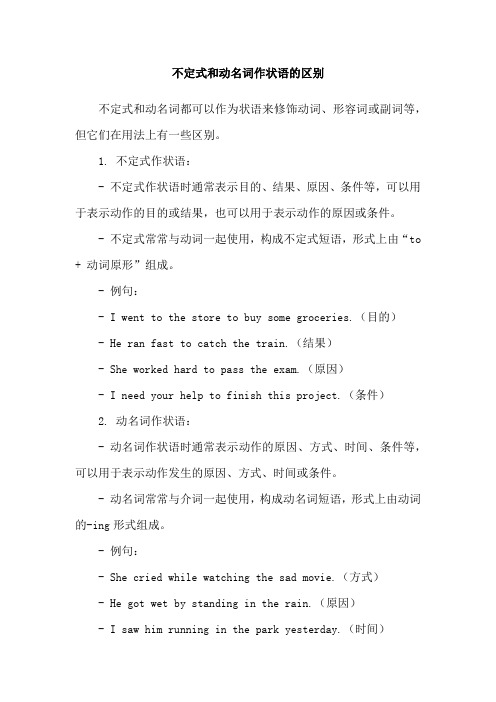
不定式和动名词作状语的区别
不定式和动名词都可以作为状语来修饰动词、形容词或副词等,但它们在用法上有一些区别。
1. 不定式作状语:
- 不定式作状语时通常表示目的、结果、原因、条件等,可以用于表示动作的目的或结果,也可以用于表示动作的原因或条件。
- 不定式常常与动词一起使用,构成不定式短语,形式上由“to + 动词原形”组成。
- 例句:
- I went to the store to buy some groceries.(目的)
- He ran fast to catch the train.(结果)
- She worked hard to pass the exam.(原因)
- I need your help to finish this project.(条件)
2. 动名词作状语:
- 动名词作状语时通常表示动作的原因、方式、时间、条件等,可以用于表示动作发生的原因、方式、时间或条件。
- 动名词常常与介词一起使用,构成动名词短语,形式上由动词的-ing形式组成。
- 例句:
- She cried while watching the sad movie.(方式)
- He got wet by standing in the rain.(原因)
- I saw him running in the park yesterday.(时间)
- They felt happy after finishing the project.(条件)总的来说,不定式更侧重于表示动作的目的、结果、原因或条件,而动名词更侧重于表示动作的原因、方式、时间或条件。
不定式状语

The man has to do some part-time jobs in his spare time so as to support his family .
那人为了养家不得不在业余时间做些另活。
You should study even harder in order to be a top student .要当尖子学生,你应更加努力学习。
A)常见的用“带to的不定式作宾语补足语”的及物动词有:
advise (劝告) , ask (请、要) , allow(允许、让) , beg(请求) , cause (使) , command (命令) , compel
(强迫) , encourage (鼓励) , expect (预料) , force (迫使) get (让) , hate (不喜欢) , help (帮助) , invite (邀请) , intend (想要) , instruct (指令) , leave (留给) , like (喜欢) , oblige (迫使) , order (命令) , permit (允许) , persuade (劝说) , prefer (宁愿) , press (强求) , remind (提醒) , request (要求) , urge (催促) , warn (警告) , want (想要) , wish (希望)
他申请给他一个去美国工作的机会。
These books are not allowed to be taken out.
这些书不得拿出去。
You are invited to banquet to be given at the embassy .
不定式作状语例句
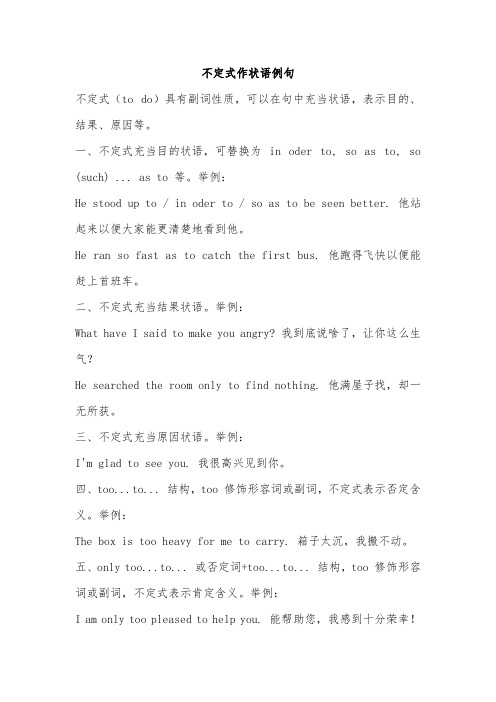
不定式作状语例句不定式(to do)具有副词性质,可以在句中充当状语,表示目的、结果、原因等。
一、不定式充当目的状语,可替换为in oder to, so as to, so (such) ... as to 等。
举例:He stood up to / in oder to / so as to be seen better. 他站起来以便大家能更清楚地看到他。
He ran so fast as to catch the first bus. 他跑得飞快以便能赶上首班车。
二、不定式充当结果状语。
举例:What have I said to make you angry? 我到底说啥了,让你这么生气?He searched the room only to find nothing. 他满屋子找,却一无所获。
三、不定式充当原因状语。
举例:I'm glad to see you. 我很高兴见到你。
四、too...to... 结构,too 修饰形容词或副词,不定式表示否定含义。
举例:The box is too heavy for me to carry. 箱子太沉,我搬不动。
五、only too...to... 或否定词+too...to... 结构,too 修饰形容词或副词,不定式表示肯定含义。
举例:I am only too pleased to help you. 能帮助您,我感到十分荣幸!We are never too old to learn. 活到老,学到老。
六、enough to... 结构,enough 后置修饰形容词或副词,意思是“足以……”。
举例:The boy is old enough to go to school. 孩子这么大了,该上学了。
七、不定式有些约定俗成的说法,可以用作独立状语,主要有:to tell the truth / to be honest 说实话to cut a long story short 长话短说to make matters worse 更糟糕的是to be sure 可以肯定的是to be frank 坦率地说举例:To be honest, the pay isn't attractive enough. 说实话,工资不够诱人。
不定式作状语的例句

不定式作状语的例句1. 不定式作目的状语,哎呀,就像你为了吃那块美味的蛋糕,专门跑去蛋糕店一样,“He came here to see me.”他来这儿就是为了看我呀!2. 不定式作结果状语,哇塞,就好比你努力复习后终于考了个好成绩,“He woke up late only to find the bus had left.”他起晚了,结果却发现公交车已经开走啦!3. 不定式作原因状语,嘿,这就像你因为喜欢她所以总是想见到她呀,“She was happy to hear the good news.”她听到这个好消息很高兴呢!4. 不定式作条件状语,可不就像如果你努力锻炼就能变得强壮一样嘛,“To succeed, you must work hard.”要成功,你就得努力工作呀!5. 不定式作让步状语,哎呀呀,就像尽管困难重重,你还是坚持下去一样,“He went to work不定式作让步状语,哎呀呀,就像尽管困难重重,你还是坚持下去一样,“He went to work despite being tired.”尽管很累,他还是去上班了呢!6. 不定式作程度状语,哇哦,就好像他极其努力地工作,“He worked so hard to achieve his goal.”他为了实现目标那么努力地工作呀!7. 不定式作目的状语,这就如同你为了减肥而每天跑步,“I studyhard to get good grades.”我努力学习就是为了取得好成绩嘛!8. 不定式作结果状语,好比你跑太快不小心摔倒了,“He ran fast only to tri p over.”他跑得太快结果绊倒了呀!9. 不定式作原因状语,不就像你因为兴奋所以睡不着觉嘛,“He was excited to stay up late.”他因为兴奋所以熬夜了呀!10. 不定式作目的状语,就像你为了看日出而早起,“She got up early to watch the sunrise.”她早起就是为了看日出呢!我觉得啊,不定式作状语真的很有趣很实用呢,能让我们的表达更加丰富多样呀!。
不定式状语
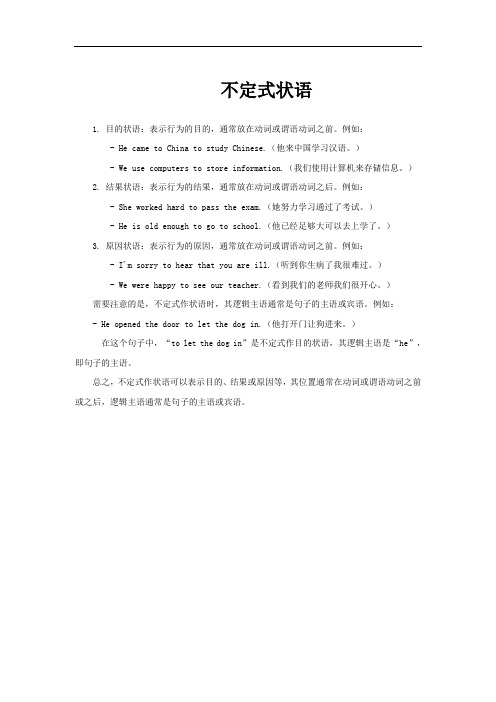
不定式状语
1. 目的状语:表示行为的目的,通常放在动词或谓语动词之前。
例如:
- He came to China to study Chinese.(他来中国学习汉语。
)
- We use computers to store information.(我们使用计算机来存储信息。
)
2. 结果状语:表示行为的结果,通常放在动词或谓语动词之后。
例如:
- She worked hard to pass the exam.(她努力学习通过了考试。
)
- He is old enough to go to school.(他已经足够大可以去上学了。
)
3. 原因状语:表示行为的原因,通常放在动词或谓语动词之前。
例如:
- I'm sorry to hear that you are ill.(听到你生病了我很难过。
)
- We were happy to see our teacher.(看到我们的老师我们很开心。
)
需要注意的是,不定式作状语时,其逻辑主语通常是句子的主语或宾语。
例如:
- He opened the door to let the dog in.(他打开门让狗进来。
)
在这个句子中,“to let the dog in”是不定式作目的状语,其逻辑主语是“he”,即句子的主语。
总之,不定式作状语可以表示目的、结果或原因等,其位置通常在动词或谓语动词之前或之后,逻辑主语通常是句子的主语或宾语。
语法-不定式做状语

不定式的分类
要点一
带to的不定式通常出现在句子的 谓语、宾语、表语等位置,…
I want to go to the park.(我想去公园。)
要点二
不带to的不定式通常出现在句子 的状语位置,例如
I come here to see you.(我来这里看你。)
02
不定式做状语的形式和功能
不定式做目的状语
表现
在句子中,不定式的逻辑主语与句子 的主语不一致,导致句子的主谓关系 混乱。
示例
例如,在句子“She is happy to see you win the game”中,“you”是 句子的主语,“She”不是“to see” 的逻辑主语,因此是不定式的错误使 用。
05
练习与巩固
填空练习
1. ____________ (被期望) to finish the project ahead of time, we worked day and night.
01
例如
他早起是为了赶火车。
02
例如
他们决定住在这家酒店以便更好地游览城市。
不定式做结果状语
例如
他努力工作,结果却遭到了解雇。
例如
由于疏忽,他未能完成作业。
不定式做条件状语
例如
除非你改变主意,否则我不会帮你。
例如
只有当他到达时,我们才会开始吃饭。
不定式做伴随状语
例如
他走进房间,同时打开了灯。
例如
改错练习
1. He is said to have written the book in a month, it is not possible. (改错)
2. He is said to have written the book in a month, it is not likely. (改错)
不定式做状语例子
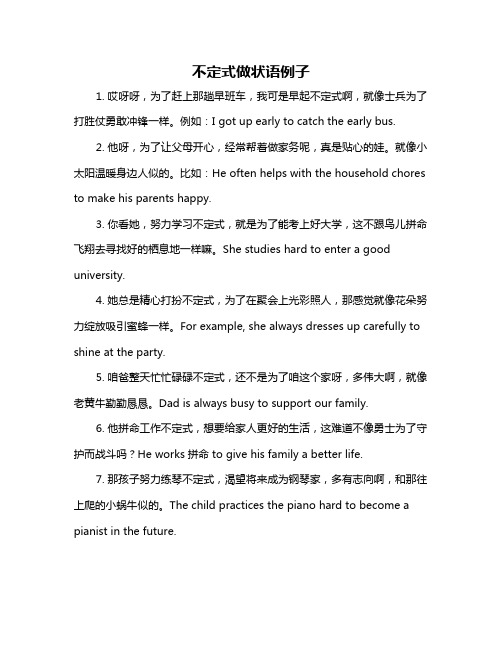
不定式做状语例子1. 哎呀呀,为了赶上那趟早班车,我可是早起不定式啊,就像士兵为了打胜仗勇敢冲锋一样。
例如:I got up early to catch the early bus.2. 他呀,为了让父母开心,经常帮着做家务呢,真是贴心的娃。
就像小太阳温暖身边人似的。
比如:He often helps with the household chores to make his parents happy.3. 你看她,努力学习不定式,就是为了能考上好大学,这不跟鸟儿拼命飞翔去寻找好的栖息地一样嘛。
She studies hard to enter a good university.4. 她总是精心打扮不定式,为了在聚会上光彩照人,那感觉就像花朵努力绽放吸引蜜蜂一样。
For example, she always dresses up carefully to shine at the party.5. 咱爸整天忙忙碌碌不定式,还不是为了咱这个家呀,多伟大啊,就像老黄牛勤勤恳恳。
Dad is always busy to support our family.6. 他拼命工作不定式,想要给家人更好的生活,这难道不像勇士为了守护而战斗吗?He works拼命 to give his family a better life.7. 那孩子努力练琴不定式,渴望将来成为钢琴家,多有志向啊,和那往上爬的小蜗牛似的。
The child practices the piano hard to become a pianist in the future.8. 她节食不定式,为了能穿上那条漂亮裙子,这执着劲真让人佩服,跟那追求梦想的人一样。
She is on a diet to fit into that beautiful dress.9. 他们夜以继日地训练不定式,就是为了在比赛中获得好成绩,这和运动员准备奥运会有啥区别呀。
动词不定式作定语和状语
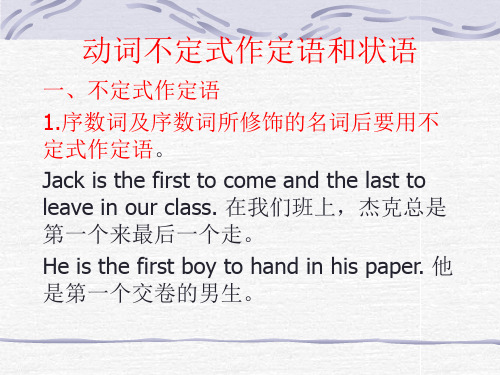
(1)不定式为不及物动词时,要在不定式后
加适当介词;
(2)不定式一般用主动形式表示被动含义,
且其后不能带宾语。
The chair is comfortable to sit on. 这椅子坐上 去很舒服。 The case is heavy to carry.这个箱子携带起来 很重。
3. 不定式作结果状语
A good soldier should have the ambition to become a general. 一个好的士兵应该 有当将军的抱负。
3.不定式作定语表示将来动作
The meeting to be held tomorrow is of great importance.明天召开的会议非常重 要。
2. 形容词后常跟不定式作原因状语 He is anxious to leave as soon as possible. 他急于尽快离开。 注:不定式在表语形容词fit, comfortable, impossible,light/heavy,hard(difficult)/easy , expensive/cheap 等后作原因状语时,如不定 式与主语之间有动宾关系,要注意两点:
He found a comfortable hotel to live in. 他 找到了一家舒适的旅馆住。
二、不定式作状语
1.不定式作目的状语
to do是一般式, so as to do, in order to do是其强调式。
(1)We eat to live.我们吃是为了活着。
(2)Tom kept quiet about the accident so as not to lose his job.为了不失去工作,汤 姆对这次事故保持沉默。
- 1、下载文档前请自行甄别文档内容的完整性,平台不提供额外的编辑、内容补充、找答案等附加服务。
- 2、"仅部分预览"的文档,不可在线预览部分如存在完整性等问题,可反馈申请退款(可完整预览的文档不适用该条件!)。
- 3、如文档侵犯您的权益,请联系客服反馈,我们会尽快为您处理(人工客服工作时间:9:00-18:30)。
3. Firemen had to break the door down to reach the people trapped inside.
A. to tell B. to be told C. telling D. told
11. He is very happy _______ his friends.
A. Seeing B. saw C. to seeing D. to see
12. She was not frightened of dancing with strangers, but she was frightened to dance with Mr. Green tonight, because she thought him dangerous.
8. I arrived at the shop only to find I’d left all my money at home.
9. He woke (up) to find himself alone in the house.
10. He hurried to the booking office only ______ that all the tickets had been sold out.
不ቤተ መጻሕፍቲ ባይዱ式做状语
主谓宾(主系表)to do sth.
(1)To do 做
状语
1. I’m saving up to buy a computer.
2. To buy a computer, I’m saving up.
3. I wrote down his phone number in order not to /so as not to forget it.
• The vocabulary and grammatical differences between British and American English are so trivial and few as hardly to be noticed.
• so…as to, such…as to, enough…to, too…to结 构做程度状语。如:
(3)To do 做
状语
• I’m glad to see you.
• I’m sorry to hear that.
• 不定式作原因状语主要用于表示表情与心理状态的 动词或表语形容词;表示人对某事某物的反应如何, 常译作“因……而……”的说法。
• 常见的这类表情心态形容词有(be)glad, happy, sorry, sad, worried, pleased, satisfied, surprised, shocked, terrified, frightened, disappointed等。
4. She arrived early in order to get a good seat.
5. I left a message so as to be sure of contacting her.
6. The time is enough to finish it.
7. He has barely enough money to live on.
• He opened his eyes only to find the world around him changed.
• We waited three hours only to be told to come again the next day.
• He lifted a stone only to have it dropped on his own feet.
心理状态+to do
Match
目的状语
in order to do so as to do to do
结果状语
so…as to do such…as to do enough…to do too…to do
原因状语 程度状语
only to do
1. To avoid any delay please phone your order direct.
in order to 和 so as to 也可以表示目的状语。 只是so as to 不可以用于句首。
如果试题考查否定式not的位置,not一律放 在to的前面。
(2)To do 做
状语
• He rushed to the airport only to find the plane had taken off.
• 如: The man shuddered to see the terrifying scene看 见这恐怖的场面这个人浑身发抖。(因为看到了这恐 怖场面,这人才浑身发抖.)
(4)To do 做
状语
• The solution works only for couples who are self-employed, don’t have small children and get along well enough to spend most of their time together.
